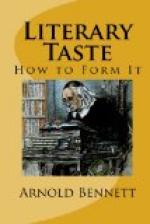Again, in Hazlitt and Leigh Hunt you will discover essayists inferior only to Lamb himself, and critics perhaps not inferior. Hazlitt is unsurpassed as a critic. His judgments are convincing and his enthusiasm of the most catching nature. Having arrived at Hazlitt or Leigh Hunt, you can branch off once more at any one of ten thousand points into still wider circles. And thus you may continue up and down the centuries as far as you like, yea, even to Chaucer. If you chance to read Hazlitt on Chaucer and Spenser, you will probably put your hat on instantly and go out and buy these authors; such is his communicating fire! I need not particularise further. Commencing with Lamb, and allowing one thing to lead to another, you cannot fail to be more and more impressed by the peculiar suitability to your needs of the Lamb entourage and the Lamb period. For Lamb lived in a time of universal rebirth in English literature. Wordsworth and Coleridge were re-creating poetry; Scott was re-creating the novel; Lamb was re-creating the human document; and Hazlitt, Coleridge, Leigh Hunt, and others were re-creating criticism. Sparks are flying all about the place, and it will be not less than a miracle if something combustible and indestructible in you does not take fire.
I have only one cautionary word to utter. You may be saying to yourself: “So long as I stick to classics I cannot go wrong.” You can go wrong. You can, while reading naught but very fine stuff, commit the grave error of reading too much of one kind of stuff. Now there are two kinds, and only two kinds. These two kinds are not prose and poetry, nor are they divided the one from the other by any differences of form or of subject. They are the inspiring kind and the informing kind. No other genuine division exists in literature. Emerson, I think, first clearly stated it. His terms were the literature of “power” and the literature of “knowledge.” In nearly all great literature the two qualities are to be found in company, but one usually predominates over the other. An example of the exclusively inspiring kind is Coleridge’s Kubla Khan. I cannot recall any first-class example of the purely informing kind. The nearest approach to it that I can name is Spencer’s First Principles, which, however, is at least once highly inspiring. An example in which the inspiring quality predominates is Ivanhoe; and an example in which the informing quality predominates is Hazlitt’s essays on Shakespeare’s characters. You must avoid giving undue preference to the kind in which the inspiring quality predominates or to the kind in which the informing quality predominates. Too much of the one is enervating; too much of the other is desiccating. If you stick exclusively to the one you may become a mere debauchee of the emotions; if you stick exclusively to the other you may cease to live in any full sense. I do not say that you should hold the balance exactly even between the two kinds. Your taste will come into the scale. What I say is that neither kind must be neglected.




